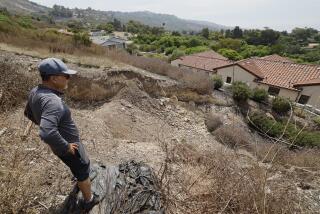Disruption of water delivery could devastate L.A. County economy
An earthquake that shuts down water deliveries from Northern California for a year could devastate the Los Angeles County economy, costing $55 billion and wiping out a half-million jobs, according to a new study.
The research by a team of economists attempts to gauge the effects of a major earthquake disrupting water deliveries from the Sacramento-San Joaquin delta, which provides roughly a quarter of Southern California’s water supply.
The report concludes that L.A. County could fairly easily weather a six-month stop in deliveries from the north by ramping up conservation efforts and using reserves stored in Southland reservoirs. But if the California Aqueduct that carries water south from the delta is dry for a year or more, the county economy would suffer severely, the researchers found.
“There are a couple of different ways to deal with this,” said Adam Rose, the study’s lead author and a research professor at USC’s Price School of Public Policy. “Protect the California Aqueduct at its source” and “make us more resilient” by investing in additional regional storage, desalination and other alternative water supply sources, he said.
The study was commissioned by the Los Angeles County Economic Development Corp. and partly funded by several water agencies, including the Metropolitan Water District of Southern California and the Los Angeles Department of Water and Power.
It was released as the state is considering a major redesign of the way it gets water from the delta, which supplies part of the Bay Area as well as the San Joaquin Valley and Southern California. Under the proposal, water would be diverted from the Sacramento River into twin water tunnels running under the delta to pumps that fill southbound aqueducts.
The tunnel project is intended in part to make deliveries less vulnerable to disruption by an earthquake, which could damage delta levees, allowing saltwater to rush in from San Francisco Bay and contaminate water exports.
The researchers used modeling to estimate the economic effect of a loss of Northern California imports for up to three years, assuming the shortages would drive up water rates and restrict local deliveries. They concluded that halting deliveries for a year during a drought could cost the county as much as $55.6 billion in gross domestic product and as many as 550,000 jobs. In times of normal rainfall, a two-year shutdown would cut the county’s gross domestic product by $75 billion and about a half-million jobs.
Those losses could be reduced substantially, Rose said, if the residential sector absorbed most of the water shortages, leaving the commercial and industrial sectors relatively unaffected. The economic effect would also be less if water rates did not rise.
The study results differ significantly from a cost-benefit analysis of the tunnel proposal conducted by David Sunding, a UC Berkeley professor of natural resource economics. Estimating the statewide effect of earthquake-related disruptions to delta deliveries, Sunding concluded the economic hit to urban ratepayers would range from $684 million for a six-month outage to $9 billion for a three-year halt.
Sunding “clearly did find significant economic impact as well,” said Roger Patterson, assistant general manager of the Metropolitan Water District. “His numbers are much less. This is probably a case of economists needing to compare notes and understand what methods were used.”
More to Read
Sign up for Essential California
The most important California stories and recommendations in your inbox every morning.
You may occasionally receive promotional content from the Los Angeles Times.











